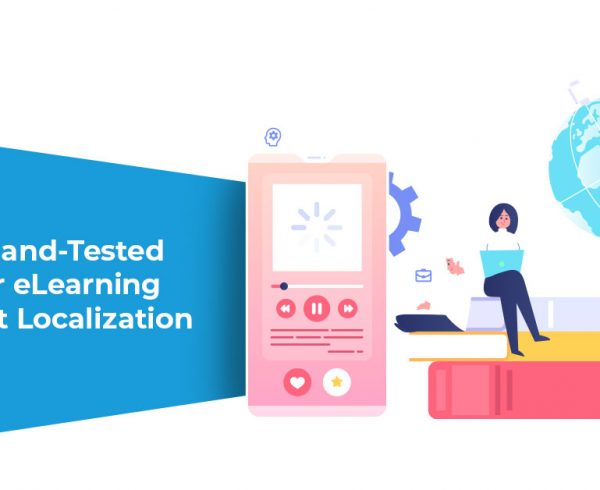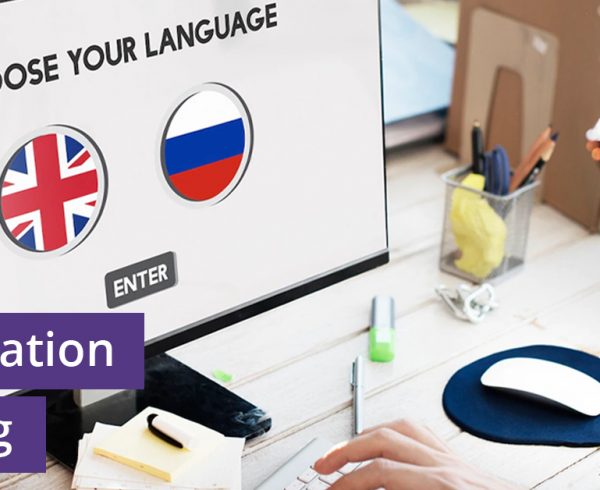Summary
The blog post highlights the importance of eLearning content localization in reaching global learners. It discusses the challenges and strategies involved in adapting eLearning content to local languages, cultures, and preferences. The post emphasizes the role of professional localization services in delivering culturally relevant and impactful eLearning experiences to a diverse audience.
“If you talk to a man in a language he understands, that goes to his head. If you talk to him in his language, that goes to his heart”. – Nelson Mandela
To remain relevant in the global market, it is imperative to keep up with emerging trends. One such trend is eLearning content localization. We live in a world where culture is valued more than ever at the workplace. Globalization demands an online training program for a worldwide audience and this has invariably lead to tailored e-learning content specific to cultural groups.
Also Read: eLearning Localization – The Next Big Trend in Employee Training
What is eLearning Content Localization?
eLearning content localization is the process of adapting your content to a specific culture, and sensibilities. Cultural sensitivity is preserved while translating and adapting the content.
Localization Vs Translation
Translation of e-learning content means translating the content from the source language to a specific language, while content localization aims at adapting to the specific culture by including images, symbols, tone of voice in audio narration, fonts, dates, currency resonating with the culture.
The Need for eLearning Content Localization
eLearning content localization is important to create content that resonates with your learner’s beliefs and culture. It imparts a holistic learning experience with many more benefits.
1. Promotes Inclusive Learning Culture
Instead of pushing the e-learning content onto the employees, organizations are pulling them towards it. Breaking the language barriers and adapting to culturally appropriate creatives and scenarios to develop content is the best way to drive employee interest. This boosts the learning process.
2. Diversified Content for Core Learning
Through eLearning content localization, you can transform the core information from the initial module and adapt it into a message for your target audience specific to each location and culture. This will help you create diversified learning content while preserving the core learning.
3. Enhanced Brand Image
Embracing the e-learning content localization practice will position your organization as one that is empathetic and respectful towards cultural differences and values employee diversity. This will help you gain the respect and trust of your employees and customers, eventually positively affecting your brand.
4. Consistent Information Flow
By e-learning content localization, you can convey a consistent message to various groups taking into account their cultural differences. This ensures that you communicate with your employees without having to compromise the learning goals and avoid ambiguity of any kind.
5. Boost Employee Performance & Retention
eLearning content localization is a personalized approach to show your employees, the efforts taken to ensure their comfort and promote a homely learning environment. As your employees relate better to the localized content, this improves information retention and eventually productivity.
6. Cost-Efficiencies
Developing one core training module and then using eLearning content localization following the cultural ethnicity of specific target groups is more cost-efficient than developing various training modules for each group separately.
Also Read: Transform Your Training Program with Learning Paths
Best Practices for eLearning Content Localization
eLearning localization is vital to reach out to your geographically dispersed and culturally diverse employees. Here are some best practices organizations should adopt for large-scale e-learning content localization.
1. Identify the Language for Target Market
Selecting the regional language for eLearning content localization must be done quite early. While developing the course content, you need to consider regional differences like laws, technical standards, and currencies, along with the language used in the target market.
2. Seek Input from Local Stakeholders
Local stakeholders are best suited to help you understand the uniqueness of the target market. Their valuable input regarding people’s expectations, cultures, and local practices can prove beneficial. To avoid delays and increased costs, local stakeholders should always be actively included in the e-learning content localization process.
3. Centralize the Localization Process
To ensure e-learning modules are consistent across all the elements such as transcription, voice-over, and subtitles, it is advisable to centralize the entire e-learning content localization process. This will help you avoid complex and fragmented translations when different people look after different aspects of localization.
4. Respect Cultural Aspects
The cornerstone of e-learning content localization is embracing cultural diversity. The language, culture, & beliefs should be respected as multiple languages & cultures reside in the same country. Aspects like an appropriate use of imagery & icons, proper formatting of the language, tone, and colors should be considered in the localization process.
5. Tailor the e-Learning Content
Customize your e-learning modules to align with the goals of your training programs. Understanding the target audience and the translation styles they expect will help you customize your modules to suit their cultural spirit. Tailored content helps you connect with them on a personal level.
6. Consider the Physical Design Components
To ensure the precise development of the e-learning content, it is important to consider the physical design aspects of cultural components. Some cultures read right to left and some language’s translation can prove to be tougher than other languages.
7. Use of Apt Localization Resources
The e-learning content localization process runs smoothly when apt resources are put into use. These include the tools and people you get on board for the e-learning content localization process.
- Authoring Tool: Select an authoring tool that includes all the necessary features and multilingual options to suit your localization needs. You can read more about how to select the right e-learning authoring tool.
- Translators: The caliber of your e-learning content localization will be highly impacted by the quality and experience of your translation team. It is advisable to onboard translators who are experienced in your industry.
- QA Testers: QA testers should be well-versed in the original course language and the language they are testing to measure the consistency in the content delivery.
- Voice-Over Artists: The difference in local dialects and accents can matter a lot to your learners. Thus, finding the right voice for your eLearning content localization project should be given the utmost importance.
Conclusion
eLearning content localization is prominent to deliver a more holistic learning experience to enhance knowledge acquisition and retention by translating any content into a given language and adapting it to a specific region and culture. To become future-ready, eLearning content localization is an important step for every organization.
Suggested Reads:
- 7 Tips to Create Custom E-Learning Content on a Budget
- Custom LMS- An Effective Way to Transform Employee Training
- 10 Reasons to Invest in Corporate Training Solutions
- How to Implement Microlearning in Corporate Training
- How to Leverage your LMS to Create a Blended Learning Environment
- Advantages of Mobile Learning Solutions for L&D Teams
To know more about how you can customize your eLearning content localization, get in touch with our experts.








